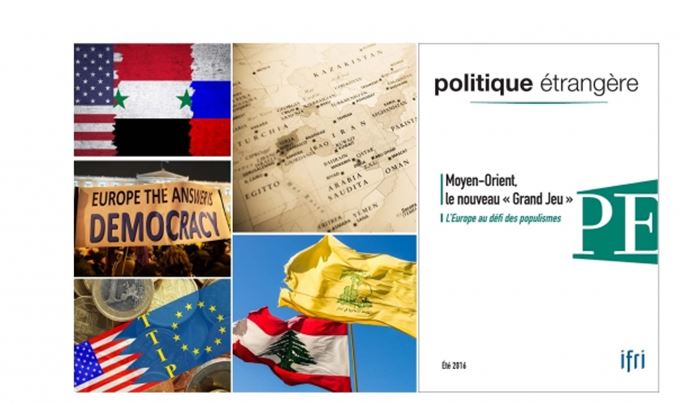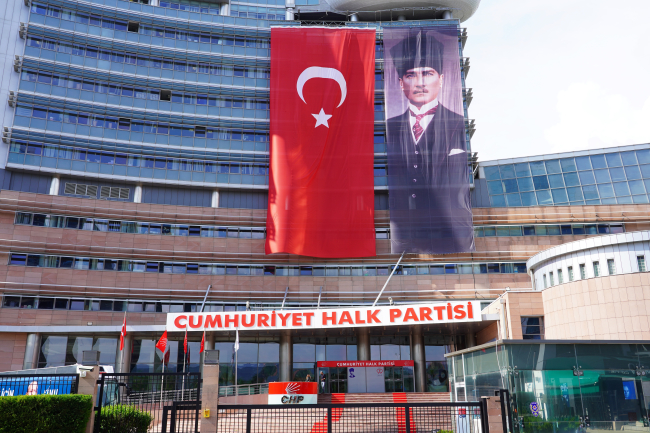Middle East, the new "Great Game"
Will a divided Middle East become the center of a new “Great Game”? The world’s global powers are aligned in it: the United States, falsely tempted by retraction; Russia, establishing its position in an unexpected state of play, France, destabilized by the contradictions of its own policy… In addition are tussles for regional hegemony between Iran, Turkey, and Saudi Arabia.

The map is being radically redrawn around Syria and Iraq, an area which will no doubt play a determinant role in the world’s future.
The European Union is absent once again from the new “Great Game”. The EU is bogged down in its own crises; the assault of all breeds of populism, and fissures reopened by authoritarian shifts in central Europe, constitute the more concerning political signs. Are the members of the European Union the agents of its collapse?
The globalized world is also organized around international commercial negotiations: the global approach of the WTO, regional approaches within areas of free trade, and more plurilateral approaches. Which dynamic will dominate and determine the nature of future systems of exchange?
The Middle East, European crises, international exchanges: Politique étrangère focuses on three dimensions of international disorder for which developments over coming months are likely to play a preponderant role.
FOCUS MIDDLE EAST, A NEW "GREAT GAME"
The Middle East thats awaits for America’s New Administration, by John McLaughlin (read the article)
Russia in the Middle East: Back to a Grand Strategy or Enforcing Multilateralism?, by Ekaterina Stepanova (read the article)
Iran’s Place in the Middle-Eastern Crisis, by Mohammad-Reza Djalili
The Constricted Emancipation of Saudi Arabia’s Foreign Policy, by Louis Blin
Turkey’s Search for a New Position in the Middle East, by Jean Marcou
French Contradictions in the Middle East, by Georges Malbrunot
COUNTER ANALYSIS Populism's Challenge to Europe
Central Europe Authoritarian Challenge, by Georges Mink
The Assault of Extremism, Populism, and Nationalism in Europe, by Jean-Dominique Giuliani
CURRENT AFFAIRS
Hezbollah and the Syrian War, by Matthieu Cimino
TTIP: too Big to Fail?, by Elvire Fabry
Is Commercial Plurilateralism an Opportunity for Developing Countries?, by Michel Dupuy
BAROMETERS
Geopolitics and the Ageing Population, by Gérard-François Dumont
States and National Oil Companies: Phenomena of the Past or Future?, by Marc-Antoine Pérouse de Montclos
South Africa: the Good International Nuclear Citizen?, by Emmanuelle Maitre
BOOK REVIEWS
Directed by Marc Hecker
The Deep State: The Fall of the Constitution and the Rise of a Shadow Government, by Mike Lofgren; America Ascendant. A Revolutionary Nation's Path to Addressing Its Deepest Problems and Leading the 21st Century, by Stanley B. Greenberg, by Laurence Nardon.
This content is available in French: L'éditorial de Politique étrangère, vol. 81, n° 2, printemps 2016.
This content is available in French: Les lectures de Politique étrangère, vol. 81, n° 2, printemps 2016.
This content is available in French: Le dossier de presse de Politique étrangère, vol. 81, n° 2, printemps 2016.

Available in:
Regions and themes
ISBN / ISSN
Share
Related centers and programs
Discover our other research centers and programsFind out more
Discover all our analyses
RAMSES 2025. Between Powers and Powerlessness
Never before have there been so many powers able to upset the international balance of power, and never before have the dominant powers seemed so powerless to counter the fragmentation of the world.
Out of Thin Air but More than a Mirage: The Politics of Saudi Arabia's Nascent Music Industry
This study critically examines Saudi Arabia’s nascent music industry, which is promoted as a key element of Vision 2030, Crown Prince Mohammed bin Salman’s strategic framework to diversify the kingdom’s economy. It explores how state-led investments in music and entertainment intersect with authoritarian governance. The author neither dismisses these investments as conspicuous spending nor reproduces an alarmist narrative of impending cultural imperialism. The article takes a political sociology approach to understand how Saudi entertainment plans consolidate domestic power and reshape regional cultural landscapes.
Hostage diplomacy of the Islamic Republic of Iran. The case of Europeans detained in Iran
The so-called hostage diplomacy of the Islamic Republic of Iran refers to a political and diplomatic strategy in which Tehran uses the detention of Western nationals, dual citizens, or Iranian citizens residing in Europe, Australia, or the United States as leverage in diplomatic negotiations. This practice aims to exert pressure to secure political, economic, or diplomatic concessions as part of Tehran’s asymmetric response strategy. Hostage diplomacy remains a controversial yet effective tool from the perspective of the Islamic Republic of Iran, given its context of economic sanctions and diplomatic isolation.
Is the Republican People’s Party (CHP) Rising from the Ashes?
The victory of the CHP [Cumhuriyet Halk Partisi, Republican People’s Party] in the Turkish municipal elections of March 2024 firmly established it as the leading party of opposition to the Islamic-conservative AKP [Adalet ve Kalkınma Partisi, Justice and Development Party], which has been in power since 2002.







